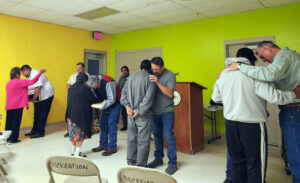
WASHINGTON (BP)–Great Britain’s apparently impending approval of the cloning of human beings for the purpose of medical research will cause repercussions throughout humanity, a Southern Baptist bioethics specialist predicts.
A panel is prepared to recommend the British government drop its ban on the “therapeutic cloning” of human embryos, according to a London newspaper. The Cabinet is expected to endorse the recommendation, thereby giving approval to the cloning of embryos for experimentation that researchers hope will result in cures for a variety of diseases, according to a London Daily Telegraph article in The Washington Times.
Extracting cells from a clone for research will result in the embryo’s destruction, however.
“We don’t have the sophisticated technology necessary to clone human organs without destroying a human life,” Ben Mitchell, a biomedical consultant for the Southern Baptist Ethics & Religious Liberty Commission, told Baptist Press. “This is all speculative science. It’s a scientific crap-shoot, and the stakes on the table are human lives.”
The British panel studying the issue has determined the potential benefits outweigh ethical questions, according to the Daily Telegraph report.
“The potential is enormous,” a source on the panel told the newspaper. “This could allow us to regrow a heart muscle or bone marrow, and that is not a threat to humanity. It is too early to say whether it will work, but if the research is illegal we will never know.”
In a commentary on the likely recommendation, Mitchell wrote, “[C]reating a human being for the purposes of killing that person for another human being’s health … sounds an awfully lot like cannibalism, only worse.
“If human cloning is permitted in the [United Kingdom], soon the United States, Japan and a host of developed countries will no doubt follow. A decision to kill one group of very young human beings will almost inevitably mean other human beings will be sacrificed for the health of those who can afford the technological fix offered by the burgeoning world biotechnological industry.
“Then one day, like the world court at Nuremberg, we will rediscover our moral compass and declare those who committed such acts to be heinous criminals,” Mitchell wrote. “This time, however, it may not be the powerful nations of the West who hold court. It may be the less well-off nations of the Southern hemisphere who hold accountable the men and women who thought the intellectual and technological seduction of reproductive cloning was just too tantalizing to resist.”
Nuremberg was the location in Germany of the post-World War II trial of Nazi criminals.
After reports surfaced last year of private groups in the United States seeking to clone embryos for research, Mitchell called for Congress to prohibit human cloning in this country. Federal funds may not be used for human cloning, but Congress has not enacted an overall ban.
Mitchell is assistant professor of bioethics and contemporary culture at Trinity Evangelical Divinity School, Deerfield, Ill.
















